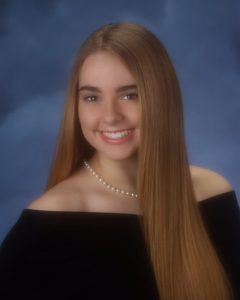
Genesis Erickson
Resides: Jacksonville
Hometown: Tampa
Involvement with BDFF: 3 years
Genesis Erickson is still trying to figure out how to best deal with her bleeding disorder. The 18-year-old University of North Florida (UNF) freshman with an eye on the medical field was 14 before she was finally diagnosed with von Willebrand’s disease at John Hopkins All Children’s Hospital in St Pete.
“I had bleeding issues long before being diagnosed,” she says. “I think they thought I was never telling the truth, that I was exaggerating.”
With no family history of bleeding disorders, and the only symptom being nosebleeds, Genesis routinely had the inside of her nose cauterized, a process that seals blood vessels and builds scar tissue.
“Throughout elementary and middle school, I would have nosebleeds almost every day,” she recalls. “I didn’t miss a lot of school days, but I would be in the school clinic for two hours a day.” She says the only thing that seemed to work was cauterizing.
Aptly named as the first and only child of Alan and Monica, Genesis’s childhood was one free of health issues, growing up like any normal girl in Tampa. Then at age 9, the nosebleeds began. That went on for five years until the day a technician caring for yet another nosebleed, suggested Genesis be tested.
Soon after being diagnosed, Genesis became involved with the Foundation, volunteering for the Tampa Superhero fundraising walk. This year, the Foundation rewarded her hard work with part-time employment to help with the Jacksonville Creepy Crawl 5K and Vampire Walk while she is attending UNF.
As a member of the bleeding disorders community, Genesis also takes advantage of the HTC at the University of South Florida in Tampa as part of her care regimen. (The HTC in Jacksonville does not serve adults.)
“They are extremely helpful, caring and patient at the HTC,” she says. “And they want to get to the root of the problem.”
With her current treatment program, the nosebleeds have lessened to being seasonal, usually occurring in November and December. Not only does that allow her to lead a pretty normal life, it limits her medication intake of Amicar, saving the family thousands in out-of-pocket expenses. But even with her medication, sometimes cauterizing still comes into play.
“I am still experimenting with it,” she says of her bleeding disorder. “I am new at this. It has only been a few years, and we are trying to find a more permanent solution.”
With her faith, family, friends and the Foundation, a solution is surely not far off.
